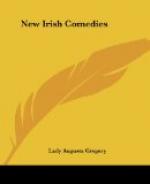In my childhood there was every year at my old home, Roxborough, or, as it is called in Irish, Cregroostha, a great sheep-shearing that lasted many days. On the last evening there was always a dance for the shearers and their helpers, and two pipers used to sit on chairs placed on a corn-bin to make music for the dance. One of them was always McDonough. He was the best of all the wandering pipers who went about from house to house. When, at my marriage, I moved from the barony of Dunkellin to the neighbouring barony of Kiltartan, he came and played at the dance given to the tenants in my honour, and he came and played also at my son’s coming of age. Not long after that he died. The last time I saw him he came to ask for a loan of money to take the train to Ennis, where there was some fair or gathering of people going on, and I would not lend to so old a friend, but gave him a half-sovereign, and we parted with kindly words. He was so great a piper that in the few years since his death myths have already begun to gather around him. I have been told that his father was taken into a hill of the Danes, the Tuatha de Danaan, the ancient invisible race, and they had taught him all their tunes and so bewitched his pipes that they would play of themselves if he threw them up on the rafters. McDonough’s pipes, they say, had not that gift, but he himself could play those inspired tunes. Lately I was told the story I have used in this play about his taking away fifty sovereigns from the shearing at Cregroostha and spending them at a village near. “I said to him,” said the old man who told me this, “that it would be better for him to have bought a good kitchen of bacon; but he said, ’Ah, when I want more, I have but to squeeze the pipes.’” The story of his wife’s death and burial as I give it has been told to me here and there. That is my fable, and the emotion disclosed by the story is, I think, the lasting pride of the artist of all ages:
“We are the music makers
And we are the dreamers of dreams....
We in the ages lying
In the buried past of the earth
Built Nineveh with our sighing,
And Babel itself with our mirth.”
I wrote the little play while crossing the Atlantic in the Cymric last September. Since it was written I have been told at Kinvara that “McDonough was a proud man; he never would go to a wedding unasked, and he never would play through a town,” So he had laid down pride for pride’s sake, at that time of the burying of his wife.
In Galway this summer one who was with him at the end told me he had a happy death, “But he died poor; for what he would make in the long nights he would spend through the summer days.” And then she said, “Himself and Reilly and three other fine pipers died within that year. There was surely a feast of music going on in some other place.”
Dates of production of plays.
THE BOGIE MEN was first produced at the Court Theatre, London, July 8, 1912, with the following cast:




